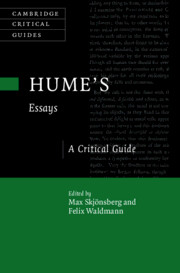Book contents
- Hume’s Essays
- Cambridge Critical Guides
- Hume’s Essays
- Copyright page
- Dedication
- Contents
- Figures
- Contributors
- Acknowledgements
- Abbreviations
- Introduction
- Part I Reception
- Chapter 1 The Reception of Hume’s Essays in Eighteenth-Century Britain
- Chapter 2 The Reception of Hume’s Essays in Eighteenth-Century Germany
- Chapter 3 ‘Aussi hardi … qu’aucun philosophe en France’:
- Part II Philosophy
- Part III Politics
- Part IV Political Economy
- Bibliography
- Index
- Cambridge Critical Guides
Chapter 2 - The Reception of Hume’s Essays in Eighteenth-Century Germany
from Part I - Reception
Published online by Cambridge University Press: 02 January 2025
- Hume’s Essays
- Cambridge Critical Guides
- Hume’s Essays
- Copyright page
- Dedication
- Contents
- Figures
- Contributors
- Acknowledgements
- Abbreviations
- Introduction
- Part I Reception
- Chapter 1 The Reception of Hume’s Essays in Eighteenth-Century Britain
- Chapter 2 The Reception of Hume’s Essays in Eighteenth-Century Germany
- Chapter 3 ‘Aussi hardi … qu’aucun philosophe en France’:
- Part II Philosophy
- Part III Politics
- Part IV Political Economy
- Bibliography
- Index
- Cambridge Critical Guides
Summary
The chapter explores how Hume’s Essays were received in Germany during the eighteenth century, highlighting the cultural exchange and intellectual shifts of that time. Hume’s influence is analysed in the context of the growing interest in English books and culture in Germany during the eighteenth century, a trend known as ‘Anglophilia’. Hume’s political and economic writings were translated into German shortly after their original publication. His name was held in high regard and his writings were considered to be instructive. But the specifics of cameralism prevented his economic and political essays from having a major impact on German discourse. Nonetheless, new translations continued to appear. In the German reform debate of the late eighteenth century, Hume’s Essays were used to both support the status quo and to advocate for political change. In the early nineteenth century, an academic translation of Hume’s essay was published, acknowledging his contribution to the formation of political economy as a science. By exploring the reception of Hume’s Essays in eighteenth-century Germany, the chapter shows how translations not only played a big role in sharing knowledge during the Enlightenment but also reflected cultural differences.
Keywords
- Type
- Chapter
- Information
- Hume's EssaysA Critical Guide, pp. 36 - 51Publisher: Cambridge University PressPrint publication year: 2025

